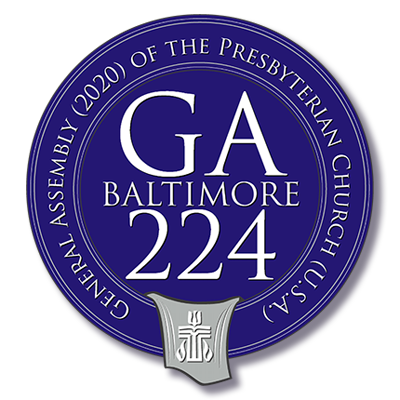
For months now, leaders in the Office of the General Assembly of the Presbyterian Church (U.S.A.) have said the upcoming 224th General Assembly (2020) will be like none other. Weeks ago, the Committee on the Office of the General Assembly (COGA) approved a plan for a three-day assembly to be held completely online.
COGA recommended that only critical business be considered and that a majority of other church business, including committee and commission reports, be referred to the 225th General Assembly (2022). The decision has been met with a mix of praise and criticism and leading some to believe COGA has already pulled together a consent agenda.
COGA Moderator Barbara Gaddis opened the committee’s weekly online meeting Thursday to clarify that no consent agenda currently exists for the assembly.
“COGA has made recommendations to the Assembly Committee on Business Referrals regarding issues that might be appropriate, but we have not made a consent agenda and there will not be one until the referral committee meets,” she said. “Everything we send to the General Assembly is a recommendation from COGA. It is the commissioners’ assembly, not ours.”
A consent agenda includes business items that are not likely to require debate prior to taking action. Traditionally, commissioners and delegates will vote on the agenda in order to take up items that might require more attention and discussion.
COGA approved a list of recommendations to the Assembly Committee on Business Referrals, including the following:
- Urge all Presbyterians to hear and heed the Gospel imperative to love God, neighbor, and self by living out a deeper commitment to active participation with Jesus Christ in the work of building God’s kindom through
- Personal and corporate repentance, spiritual renewal, and devotion to the Great Ends of the Church;
- Listening and responding to the voices of peoples long silenced by participation through programs such as Hands and Feet: Presbyterians Engaging in Communities and the Poor People’s Campaign;
- Energetic, intelligent, imaginative, and loving involvement in the intertwined Matthew 25 foci: building congregational vitality, dismantling structural racism, and eradicating systemic poverty.
- Direct the Office of the General Assembly and the Presbyterian Mission Agency to review all items of business referred to the 225th General Assembly (2022) to consider prayerfully whether the recommendations could be enacted under current social witness policy or the authority of agencies and their boards to make programmatic decisions between assemblies.
- Encourage congregations, sessions, presbyteries, and synods to review items of business referred to the 225th General Assembly (2022) and prayerfully consider the call of God to work and witness for the goals and values expressed therein.
Tricia Dykers Koenig, OGA’s assistant director of Mid Council Ministries, brought the recommendation.
“We have heard from many that the church must speak at this moment. The sense of definition of what’s core and critical has shifted since COGA made this determination with the pandemic,” she said. “In terms of assembly business, we are not lacking in policy, programs, or study resources. We need the will to make this a true turning point.”
COGA also approved a proposal to invite the Presbyterian Mission Agency Board to partner and provide an optional online space for commissioners of color to gather for conversation, prayer and support. The recommendation follows several weeks of demonstrations across the country following the deaths of African Americans by police action.
The first gathering would be scheduled before the start of the assembly meeting and the second one would be held during a break on plenary day June 26 or 27.
“We believe this would be a good idea where the topic is purposely not about GA business, but a time for commissioners and advisory delegates of color to pray and share,” said COGA Vice Moderator Stephanie Anthony. “The conveners of these sessions would be instructed to not talk about assembly business.”
In other action, COGA approved a recommendation to extend time in the first plenary on June 19, giving commissioners and advisory delegates an additional hour of time and pushing the Co-Moderators’ election to 9 p.m. Eastern Time.
COGA will also work with the General Assembly Committee on Representation (GACOR) to ensure it can adequately assess the processes and procedures of an online assembly. Recordings and data will be shared with members of GACOR after each plenary.
COGA has received praise and criticism for not setting aside more time to deal with social justice issues at the assembly. The Reverend Dr. J. Herbert Nelson, II, Stated Clerk of the General Assembly of the PC(USA), says the church can be assured that a lot of time and effort went into making this General Assembly the best it can be under the circumstances.
“The thing we need to keep in mind about this particular assembly is that it is very different than any we’ve had before. We anticipated this might happen, so it has not been thrown together,” he said. “We’ve had many discussions on the processes and how to be creative when we will not be in the same space. We have also been conscientious about the issues of race because we have seen what has taken place in the past three weeks.”
Nelson affirmed the church’s commitment to social justice work, adding there is enough social justice policy to do the work.
“We are still writing letters and still being called by our international partners to engage in advocacy. Nothing has changed,” he said. “We continue to be connected to issues through the Washington office and the office at the United Nations. We are more sensitive to issues of race than ever before. Because of that, there have been safeguards and assurance made by our office to do the very things we have been doing while moving into a new format.”
COGA is scheduled to host another meeting Thursday.
